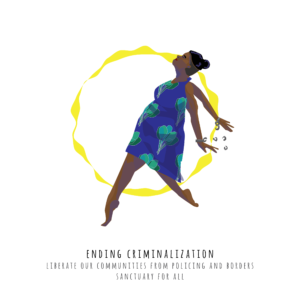
What Is HIV Criminalization?
HIV criminalization refers to the use of laws and policies to target and punish people based on their HIV positive status. As of January 2019, 34 states and 2 territories have specific laws that criminalize the alleged potential exposure, non-disclosure, or potential transmission of HIV. Most of these misinformed laws were enacted in the 1980s but are still used regularly against people living with HIV. They create criminal penalties for oral, anal, or vaginal sex, exposure to saliva or blood, sharing needles, donating organs, semen, blood, or breastmilk (including breastfeeding). Many of these acts are scientifically proven not to transmit HIV, including sex with an undetectable viral load or with a condom.
Other related laws include harsher sentences for people living with HIV charged under laws criminalizing sex work and drug use. See our 2019 Harm Reduction factsheet for more detail about this. People living with HIV have also been punished under laws that criminalize exposure or transmission of sexually transmitted infections (STIs). Even in states without HIV-specific criminal laws, people have been prosecuted for HIV exposure and transmission under general criminal laws including reckless endangerment, assault, bioterrorism, homicide, and attempted homicide.
These laws are stigmatizing and discriminatory, targeting people based on health status for acts that would not otherwise be illegal or so harshly penalized. Unlike other criminal laws, most HIV criminalization laws do not require transmission nor proof of an intent to harm: guilt is assumed just based on the person knowing their HIV positive status. A study by the Williams Institute of HIV criminalization in California revealed that out of 385 incidents of one or more HIV-specific charge being brought against a person living with HIV, every single incident resulted in a conviction for at least one charge.
Current State of Play: HIV Criminalization, Policing, Gender and Race
Like other parts of the criminal justice system, enforcement of HIV criminalization laws is rooted deeply in racial biases. The Williams Institute reported that Black and Latinx people made up 67% of those who encountered the California criminal justice system related to HIV laws but made up only 51% of people living with HIV in the state . Immigrants charged under HIV criminalization laws may face police harassment, detention and deportation.
Studies have shown that HIV criminalization laws disproportionately target and harm women of color, women who do sex work, and women of trans experience. HIV criminalization laws can increase vulnerability to law enforcement and from intimate partners, who may threaten prosecution to coerce them into staying in an unhealthy or unsafe relationship. Those in abusive relationships may be faced with a Sophie’s choice between violence if they disclose their HIV status or arrest if they do not disclose.
Consequences of being charged under an HIV criminalization law are severe, even if not convicted, and persist long after a person leaves the criminal justice system. The long-term harm of experiencing HIV criminalization can impact every aspect of the person’s life, including:
In addition, 6 states require registration as a sex offender as part of the punishment under HIV-specific laws, creating additional concerns related to parenting, employment, privacy, and safety.
What Can Be Done?
At the federal level:
At the state level:
Where Can I Learn More?
Find more policy recommendations related to criminalization as it intersects with sex work and drug use here.
- Center for HIV Law and Policy:
- Lambda Legal:
- Positive Women’s Network-USA
- The Sero Project:
- The Williams Institute


